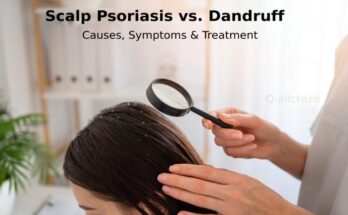Introduction
Hair loss and thinning hair are concerns for many people across the globe. Among the numerous natural remedies touted for addressing hair loss, castor oil is one of the most popular. Some people claim that castor oil can help regrow hair and improve scalp health. But is there scientific evidence to support these claims? In this article, we will examine the role of castor oil in hair regrowth and whether it can be an effective treatment for hair loss.
What Is Castor Oil?
Castor oil is a vegetable oil obtained from the seeds of the Ricinus communis plant. It has been used for centuries in traditional medicine for a variety of purposes, including as a laxative, skin moisturizer, and hair treatment. The oil is rich in ricinoleic acid, a type of fatty acid that some believe may promote hair health.
The Science Behind Castor Oil and Hair Growth
1. Ricinoleic Acid and Its Anti-inflammatory Properties
One of the main components of castor oil is ricinoleic acid, which has anti-inflammatory properties. Hair loss can sometimes be triggered by inflammation of the scalp, which can damage hair follicles. While ricinoleic acid may help reduce inflammation, there is limited evidence directly linking it to hair regrowth.
2. Moisturization and Scalp Health
Healthy hair growth begins with a healthy scalp. Castor oil is highly moisturizing and can help prevent dryness and flakiness, which are common issues that may affect hair health. While keeping the scalp hydrated can support hair retention and overall scalp health, moisturization alone doesn’t necessarily stimulate new hair growth.
3. Antimicrobial and Antifungal Properties
Castor oil has mild antimicrobial and antifungal properties, which may help combat scalp infections that could lead to hair loss. Conditions such as seborrheic dermatitis or fungal infections can impair hair growth, and maintaining a clean, infection-free scalp may aid in preventing further hair loss.
Can Castor Oil Regrow Hair?
While castor oil can help create a healthier environment for hair to grow by addressing scalp issues, it is not scientifically proven to directly regrow hair. The majority of claims regarding castor oil’s ability to regrow hair are anecdotal, and there are no large-scale clinical studies that confirm its efficacy for this purpose.
It’s important to note that hair growth is complex, and a variety of factors such as genetics, hormonal imbalances, medical conditions, and nutritional deficiencies all play a role. For individuals experiencing hair loss due to genetic factors like male or female pattern baldness, castor oil alone is unlikely to be an effective treatment.
How to Use Castor Oil for Hair Care
Although castor oil may not regrow hair, it can still be a beneficial addition to your hair care routine for promoting scalp health and improving the overall appearance of your hair.
Step-by-step guide to using castor oil:
- Patch Test: Before applying castor oil to your scalp, conduct a patch test on a small area of skin to check for any allergic reactions.
- Dilution: Castor oil is very thick, so it’s best to dilute it with a carrier oil like coconut or almond oil for easier application.
- Scalp Massage: Warm the oil mixture slightly and gently massage it into your scalp. This can help stimulate blood circulation, which is important for hair health.
- Leave It On: Let the oil sit on your scalp for at least 30 minutes, or leave it overnight for a deeper treatment.
- Rinse Thoroughly: Wash your hair with a gentle shampoo to remove the oil.
- Repeat this process once or twice a week for best results.
Other Natural Remedies for Hair Growth
If you’re looking for natural ways to promote hair growth, here are some other options that may offer more scientifically supported benefits:
1. Minoxidil (Rogaine)
This is one of the most widely researched and effective treatments for hair regrowth. It has been approved by the FDA for treating both male and female pattern baldness.
2. Biotin Supplements
Biotin is a B-vitamin that supports hair, skin, and nail health. While a deficiency in biotin can lead to hair thinning, taking biotin supplements may improve hair health in people with a deficiency.
3. Saw Palmetto
This herbal supplement has been studied for its potential to block DHT, a hormone linked to hair loss, especially in men with androgenetic alopecia (male pattern baldness).
FAQs
1. Can castor oil make your hair thicker?
While castor oil is not proven to regrow hair, it can improve the appearance of hair by moisturizing the scalp and hair strands, which can make the hair appear thicker and healthier.
2. Is castor oil safe for all hair types?
Yes, castor oil is generally safe for all hair types, but its thick consistency can make it challenging to wash out, especially for people with fine hair. It’s recommended to dilute it with a lighter carrier oil.
3. How often should I apply castor oil to my scalp?
You can apply castor oil to your scalp once or twice a week. Overuse may lead to buildup, so make sure to thoroughly wash your hair afterward.
4. Can castor oil prevent hair loss?
Castor oil may help prevent hair loss indirectly by keeping the scalp healthy and addressing issues like dryness, inflammation, and infections. However, it is not a cure for genetic or medical causes of hair loss.
5. Is there any scientific proof that castor oil regrows hair?
No, there is no scientific evidence to support the claim that castor oil directly stimulates hair regrowth. Most of the claims are based on personal anecdotes rather than clinical research.
Conclusion
While castor oil has many beneficial properties, such as its ability to moisturize the scalp and reduce inflammation, there is no scientific evidence to support its use as a hair regrowth treatment. However, castor oil can be a great addition to a holistic hair care routine by improving scalp health and providing hydration. For those experiencing severe hair loss, it’s best to consult a healthcare provider or dermatologist to explore proven medical treatments.




